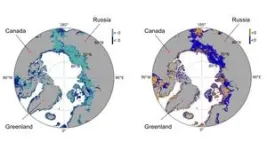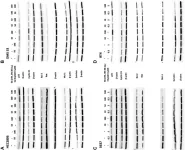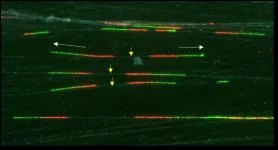(Press-News.org) Metin Akay, founding chair of the Biomedical Engineering Department at the University of Houston and John S. Dunn Professor, is one of 50 top scientists from 34 elite universities to publish a roadmap for groundbreaking research to transform the landscape of medicine in the coming decade.
Published on behalf of the Institute of Electrical and Electronics Engineers (IEEE), the world’s largest technical professional organization dedicated to advancing technology for humanity and the IEEE Engineering in Medicine and Biology Society (IEEE EMBS), the paper focus on five cutting-edge advances in biomedical engineering and their applications in medicine.
“This paper represents a valuable guideline in the advancement of engineering innovations in healthcare, so that we can improve the quality of healthcare, reduce costs, ultimately, improve lives of people worldwide,” said consortium member Akay. “We have a shared commitment to advancing patient-centric technologies, and healthcare efficacy and accessibility, especially for major healthcare challenges such as chronic conditions, substance abuse and mental disorders.”
Though the ongoing meetings and group effort took more than three years, the position paper was the result of a two-day workshop organized by IEEE EMBS and the Department of Biomedical Engineering at Johns Hopkins University and the Department of Bioengineering at the University of California San Diego.
Through the workshop, the researchers identified five primary medical challenges that have yet to be addressed, but by solving them with advanced biomedical engineering approaches, can greatly improve human health.
The Five Grand Challenges Facing Biomedical Engineering
Bridging precision engineering and precision medicine for personalized physiology avatars
In an increasingly digital age, we have technologies that gather immense amounts of data on patients, which clinicians can add to or pull from. Making use of this data to develop accurate models of physiology, called “avatars” – which take into account multimodal measurements and comorbidities, concomitant medications, potential risks and costs – can bridge individual patient data to hyper-personalized care, diagnosis, risk prediction, and treatment. Advanced technologies, such as wearable sensors and digital twins, can provide the basis of a solution to this challenge.
The pursuit of on-demand tissue and organ engineering for human health
Tissue engineering is entering a pivotal period in which developing tissues and organs on demand, either as permanent or temporary implants, is becoming a reality. To shepherd the growth of this modality, key advancements in stem cell engineering and manufacturing – along with ancillary technologies such as gene editing – are required. Other forms of stem cell tools, such as organ-on-a-chip technology, can soon be built using a patient’s own cells and can make personalized predictions and serve as “avatars.”
Revolutionizing neuroscience using artificial intelligence (AI) to engineer advanced brain-interface systems
Using AI, we have the opportunity to analyze the various states of the brain through everyday situations and real-world functioning to noninvasively pinpoint pathological brain function. Creating technology that does this is a monumental task, but one that is increasingly possible. Brain prosthetics, which supplement, replace or augment functions, can relieve the disease burden caused neurological conditions. Additionally, AI modeling of brain anatomy, physiology, and behavior, along with the synthesis of neural organoids, can unravel the complexities of the brain and bring us closer to understanding and treating these diseases.
Engineering the immune system for health and wellness
With a heightened understanding of the fundamental science governing the immune system, we can strategically make use of the immune system to redesign human cells as therapeutic and medically invaluable technologies. The application of immunotherapy in cancer treatment provides evidence of the integration of engineering principles with innovations in vaccines, genome, epigenome and protein engineering, along with advancements in nanomedicine technology, functional genomics and synthetic transcriptional control.
Designing and engineering genomes for organism repurposing and genomic perturbations
Despite the rapid advances in genomics in the past few decades, there are obstacles remaining in our ability to engineer genomic DNA. Understanding the design principles of the human genome and its activity can help us create solutions to many different diseases that involve engineering new functionality into human cells, effectively leveraging the epigenome and transcriptome, and building new cell-based therapeutics. Beyond that, there are still major hurdles in gene delivery methods for in vivo gene engineering, in which we see biomedical engineering being a component to the solution to this problem.
With more than 12,000 members residing in some 97 countries around the globe, IEEE EMBS fosters fellowships and provides access to best practices, new information, innovative ideas, and a variety of expert opinions focusing on biomedical engineering--one of science’s fastest growing fields.
END
University of Houston engineer Metin Akay featured in study highlighting 50 scientists' contributions to biomedical engineering advancements
Group publishes study detailing global effort to achieve technological, medical breakthroughs
2024-03-04
ELSE PRESS RELEASES FROM THIS DATE:
JWST captures the end of planet formation
2024-03-04
March 4, 2024, Mountain View, CA – The James Webb Space Telescope (JWST) is helping scientists uncover how planets form by advancing understanding of their birthplaces and the circumstellar disks surrounding young stars, in a paper published in the Astronomical Journal, a team of scientists led by Naman Bajaj of the University of Arizona and including Dr. Uma Gorti at the SETI Institute, image for the first time, winds from an old planet-forming disk (still very young relative to the Sun) which is actively dispersing its gas ...
Good news—MS drugs taken while breastfeeding may not affect child development
2024-03-04
EMBARGOED FOR RELEASE UNTIL 4 P.M. ET, MONDAY, MARCH 4, 2024
MINNEAPOLIS – Certain medications for multiple sclerosis (MS) called monoclonal antibodies, taken while breastfeeding, may not affect the development of a child during the first three years of life, according to a preliminary study released today, March 4, 2024. The study will be presented at the American Academy of Neurology’s 76th Annual Meeting taking place April 13–18, 2024, in person in Denver and online. The study examined four monoclonal antibodies for MS: natalizumab, ocrelizumab, rituximab and ofatumumab.
MS is a disease in which the body’s immune system attacks ...
Programs intended to reduce health insurance premiums may make coverage less affordable for the middle class
2024-03-04
PITTSBURGH, March 4, 2024 — Reinsurance programs, which were created to help lower premiums and increase enrollment in the Affordable Care Act’s health insurance marketplaces, may have had the opposite effects for many potential marketplace enrollees, according to a study by health policy researchers at the University of Pittsburgh School of Public Health, Duke University and University of Minnesota.
The study, published today in Health Affairs, is the first to examine the effects of a post-American Rescue Plan Act ...
PrEP discontinuation in a US national cohort of sexual and gender minority populations, 2017–22
2024-03-04
In the U.S., sexual and gender minority populations are disproportionately affected by HIV. Pre-exposure prophylaxis (PrEP) is a key prevention method, but its effectiveness relies on consistent usage. While a significant body of research has addressed PreP initiation and adherence, far less attention has been paid to the reasons for and consequences of PrEP discontinuation.
A team of investigators conducted a four-year U.S. national cohort study exploring PrEP discontinuation among sexual and gender minority people who initiated PrEP. “Our cohort was entirely comprised of individuals ...
USC Study: Medicare Part D plans increased restrictions on drug coverage
2024-03-04
Medicare Part D plans significantly increased restrictions on prescription drugs, excluding more compounds from coverage or subjecting more of them to review before patients could access the treatments, according to a new study from USC researchers.
Among drugs not in Medicare “protected classes,” the share of drug compounds restricted or excluded by Part D plans surged from an average of 31.9% in 2011 to 44.4% in 2020, according to the study published in the March 2024 issue of Health Affairs. Brand-name-only compounds (those without a generic alternative) were especially limited, with more ...
Sacituzumab govitecan plus platinum-based chemotherapy in breast, bladder, and lung carcinomas
2024-03-04
“[...] these results support the rationale and potential for favorable clinical outcomes of combining SG therapy with platinum-based chemotherapeutics in solid tumors.”
BUFFALO, NY- March 4, 2024 – A new research paper was published in Oncotarget's Volume 15 on February 22, 2024, entitled, “Sacituzumab govitecan plus platinum-based chemotherapy mediates significant antitumor effects in triple-negative breast, urinary bladder, and small-cell lung carcinomas.”
Sacituzumab govitecan (SG) is an antibody-drug conjugate composed of an anti-Trop-2-directed antibody ...
Global study unveils "problematic" use of porn
2024-03-04
A major international study led by a Canadian psychologist sheds light on a hidden phenomenon: how problematic use of pornography is affecting people in different parts of the world, across various genders and sexual orientations.
Published in the journal Addiction, the research stands out because, among the 82,000 people in 42 countries studied, it looks at groups that were often overlooked in the past, including women and individuals who don't fit traditional gender categories.
In their findings, largely based on ...
Newly discovered protein prevents DNA triplication
2024-03-04
This is a natural 'anti-failure' mechanism in the DNA copying process, hitherto unknown.
The DNA molecule is copied each time a cell divides. If, instead of being copied once, the DNA is copied several times, i.e. tripled or even quadrupled, the likelihood of cancer increases..
The new discovered anti-failure system relies on a protein called RAD51 to prevent DNA that has already been copied from being copied again.
Every time a cell divides, its DNA is duplicated so that the two daughter cells have the same genetic material as their parent. This means that millions of times a day ...
Less ice in the arctic ocean has complex effects on marine ecosystems and ocean productivity
2024-03-04
Over the past 25 years, the amount of summer Arctic sea ice has diminished by more than 1 million square kilometers. As a result, vast areas of the Arctic Ocean are now, on average, ice free in summer. Scientists are closely monitoring how this impacts sunlight availability and marine ecosystems in the far north.
“Many questions arise when such large areas become ice-free and can receive sunlight. A prevailing paradigm suggests that the Arctic Ocean is rapidly becoming more productive as sunlight becomes ...
Antarctica’s coasts are becoming less icy
2024-03-04
EMBARGOED UNTIL MARCH 4, 2024 AT 3:00PM U.S EASTERN TIME
An increase in pockets of open water in Antarctica’s sea ice (polynyas) may mean coastal plants and animals could one day establish on the continent, University of Otago-led research suggests.
The research, published in the prestigious international journal Proceedings of the National Academy of Science, aimed at understanding where open water might allow coastal species to settle in the future.
Led by Research Fellow Dr Grant Duffy from Otago’s Department ...
LAST 30 PRESS RELEASES:
The hidden breath of cities: Why we need to look closer at public fountains
Rewetting peatlands could unlock more effective carbon removal using biochar
Microplastics discovered in prostate tumors
ACES marks 150 years of the Morrow Plots, our nation's oldest research field
Physicists open door to future, hyper-efficient ‘orbitronic’ devices
$80 million supports research into exceptional longevity
Why the planet doesn’t dry out together: scientists solve a global climate puzzle
Global greening: The Earth’s green wave is shifting
You don't need to be very altruistic to stop an epidemic
Signs on Stone Age objects: Precursor to written language dates back 40,000 years
MIT study reveals climatic fingerprints of wildfires and volcanic eruptions
A shift from the sandlot to the travel team for youth sports
Hair-width LEDs could replace lasers
The hidden infections that refuse to go away: how household practices can stop deadly diseases
Ochsner MD Anderson uses groundbreaking TIL therapy to treat advanced melanoma in adults
A heatshield for ‘never-wet’ surfaces: Rice engineering team repels even near-boiling water with low-cost, scalable coating
Skills from being a birder may change—and benefit—your brain
Waterloo researchers turning plastic waste into vinegar
Measuring the expansion of the universe with cosmic fireworks
How horses whinny: Whistling while singing
US newborn hepatitis B virus vaccination rates
When influencers raise a glass, young viewers want to join them
Exposure to alcohol-related social media content and desire to drink among young adults
Access to dialysis facilities in socioeconomically advantaged and disadvantaged communities
Dietary patterns and indicators of cognitive function
New study shows dry powder inhalers can improve patient outcomes and lower environmental impact
Plant hormone therapy could improve global food security
A new Johns Hopkins Medicine study finds sex and menopause-based differences in presentation of early Lyme disease
Students run ‘bee hotels’ across Canada - DNA reveals who’s checking in
SwRI grows capacity to support manufacture of antidotes to combat nerve agent, pesticide exposure in the U.S.
[Press-News.org] University of Houston engineer Metin Akay featured in study highlighting 50 scientists' contributions to biomedical engineering advancementsGroup publishes study detailing global effort to achieve technological, medical breakthroughs







